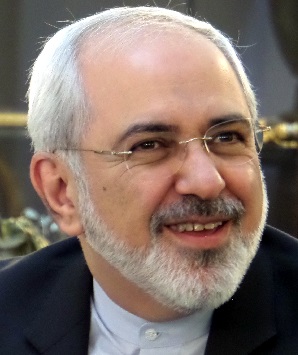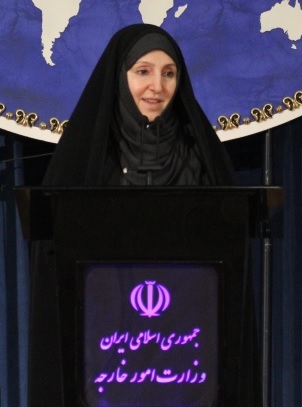On March 26, Saudi Arabia began conducting airstrikes against Houthi positions in Yemen, which drew strong condemnation from Iranian officials. Foreign Minister Mohammad Javad Zarif demanded an “immediate halt” to Saudi military actions. Iran is widely seen as the main backer of the Houthis, a Zaydi Shiite movement that has been fighting Yemen’s Sunni-majority government since 2004. The Houthis have controlled the capital city Sanaa since September 2014.
Saudi Arabia carried out the strikes with a coalition of nine other nations. The United Arab Emirates, Kuwait, Bahrain, Qatar, Jordan, Morocco, and Sudan contributed jets to the operation, while Pakistan and Egypt provided naval support. The United States did not contribute warplanes, but provided intelligence and logistical support, according to a senior State Department official.
The following are excerpted remarks from Iranian officials on the Saudi airstrikes in Yemen.
President Hassan Rouhani
Foreign Minister Mohammad Javad Zarif

"We want an immediate halt to Saudi Arabia's military operations in Yemen.”
"We will make all our efforts to control the crisis in Yemen."
—March 26, 2015, according to the press
"The Saudi-led airstrikes should stop immediately and it is against Yemen's sovereignty."
—March 26, 2015, according to the press
Deputy Foreign Minister for Arab-African Affairs Hossein Amir Abdollahian
"We condemn foreign interference with the situation in Yemen by any country, be it Iran, Saudi Arabia, or the United States.”
"Carrying out airstrikes and starting a war is easy. Putting an end to a war and quitting a war is hard."
—March 26, 2015, according to the press
Foreign Ministry Spokeswoman Marziyeh Afkham

"Iran wants an immediate halt to all military aggressions and air strikes against Yemen and its people."
—March 26, 2015, according to the press
"Resorting to military acts against Yemen which is entangled in an internal crisis and fighting terrorism will further complicate the situation, spread the range of crisis and destroy opportunities to settle the internal differences in Yemen peacefully.”
"This aggression will merely result in the spread of terrorism and extremism and will spread insecurity to the entire region."
—March 26, 2015, according to the press
“These operations are a dangerous step and completely contrary to international obligations in respecting the national sovereignty of other countries.”
—March 26, 2015, according to the press
Head of Parliament's National Security and Foreign Policy Committee Alaedin Boroujerdi
“The fact that Saudi Arabia has fanned the flames of a new war in the region shows its carelessness."
“The smoke of this fire will go into the eyes of Saudi Arabia as war is never limited to one place only. We hope this military operation will be halted immediately and the Yemen problem solved through political means.”
“America, which leads the fire mongering in the region, has supported this act and no doubt Saudi Arabia and some countries in the Arab cooperation council would not get involved without America's permission."
“Having imposed long years of crisis in Iraq, Syria and Afghanistan, America has in practice started another crisis and massacre on the Islamic world and this act is strongly condemned."
—March 26, 2015, according to the press
Saudi Arabia
The Saudi Ambassador to the United States Adel bin Ahmed al Jubeir made the following statement about the airstrikes on March 26.
“The Kingdom Saudi Arabia has launched military operations in Yemen, as part of a coalition of over ten countries in response to a direct request from the legitimate government of Yemen. The operation will be limited in nature, and designed to protect the people of Yemen and its legitimate government from a takeover by the Houthis and a Houthi violent and extremist militia. The Gulf Cooperation Council (GCC) countries have tried to facilitate a peaceful transition of government in Yemen, but the Houthis have continuously undercut the process by occupying territory and seizing weapons belonging to the government. In spite of repeated efforts by the GCC, Group of 10 countries and the Special Representative of the U.N. Secretary General to seek a peaceful way to implement the GCC initiatives and the outcomes of the national dialogue that define the political transition in Yemen, the Houthis have reneged on every single agreement they have made and continue their quest to take over the country by violent means. They captured the capital city of Sanaa, they placed the legitimate president, prime minister and cabinet members under house arrest, they seized the security services and they continue to expand their occupation of the country.
President Abd Rabbo Mansour Hadi of Yemen made a request to the Custodian of the Two Holy Mosques King Salman bin Abdulaziz to convene a conference under the auspices of the GCC to which all Yemeni political factions seeking to preserve security and stability in Yemen would be invited. The Houthis rejected this invitation and continued their violent onslaught in Yemen to the point where they were threatening to occupy the city of Aden, which had become the temporary capital for the legitimate government of President Hadi after he was able to escape from Sanaa. In a letter, dated March 24, 2015, President Hadi made, based on the principle of self-defense, enshrined in Article 51 of the U.N. Charter, as well as in the Arab League charter’s collective defense mechanism, a request for immediate support - by all means necessary - including military intervention to protect Yemen and its people from the continued Houthi aggression and to support it in fighting al Qaeda and ISIS.â€
Based on the appeal from President Hadi, and based on the Kingdom’s responsibility to Yemen and its people, the Kingdom of Saudi Arabia, along with its allies within the GCC and outside the GCC, launched military operations in support of the people of Yemen and their legitimate government.”
“We will do whatever is necessary to protect the legitimate government in Yemen, prevent it from falling and to encounter the dangers of the militia. The situation in Yemen is dangerous and has never happened in history that a militia was able to control air forces or ballistic missiles and heavy weapons and this is a very dangerous situation and we will do everything we can to protect the Yemeni people and the legitimate government in Yemen.”
Photo credit: Zarif by Robin Wright; Afkham via Iran's Ministry of Foreign Affairs
 "Iran wants an immediate halt to all military aggressions and air strikes against Yemen and its people."
"Iran wants an immediate halt to all military aggressions and air strikes against Yemen and its people."